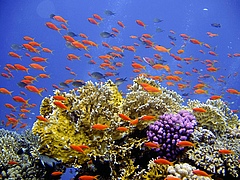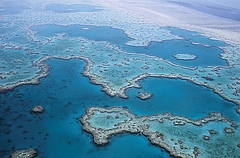16.11.2017 | TOP NEWS, Biodiversity Synthesis
Numbers of reef fish species vary between ecoregions. But some differences only show when looking at large areas

Coral reefs provide habitat for many fish species. (Photo: Pixabay)

The “coral triangle” near Australia is a hotpot of fish species richness. (Photo: Pixabay)
Note for the media: Use of the pictures provided by iDiv is permitted for reports related to this media release only, and under the condition that credit is given to the picture originator.
The study was published in the Proceedings of the Royal Society B and involved by scientists from iDiv, Martin Luther University Halle-Wittenberg and Tel Aviv University. The scientists’ findings have great implications for measuring biodiversity and for conservation practices. In areas where species are more aggregated, protected areas need to be larger.Original publication (iDiv-affiliated scientists in bold):Contact:
Dr Shane Blowes (English)
Postdoc of the research group “Biodiversity Synthesis” at the German Centre for Integrative Biodiversity Research (iDiv) and the Martin Luther University Halle-Wittenberg (MLU)
Tel.: +49 341 9733 196
Web: https://www.idiv.de/en/groups_and_people/employees/details/eshow/blowes_shane.html
and
Dr Volker Hahn (English, German)
iDiv “Media & Communications”
Tel.: +49 341 9733 154
Web: https://www.idiv.de/en/groups_and_people/central_management/media_and_communications.html
